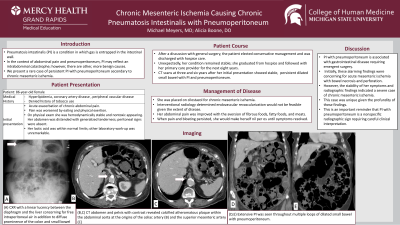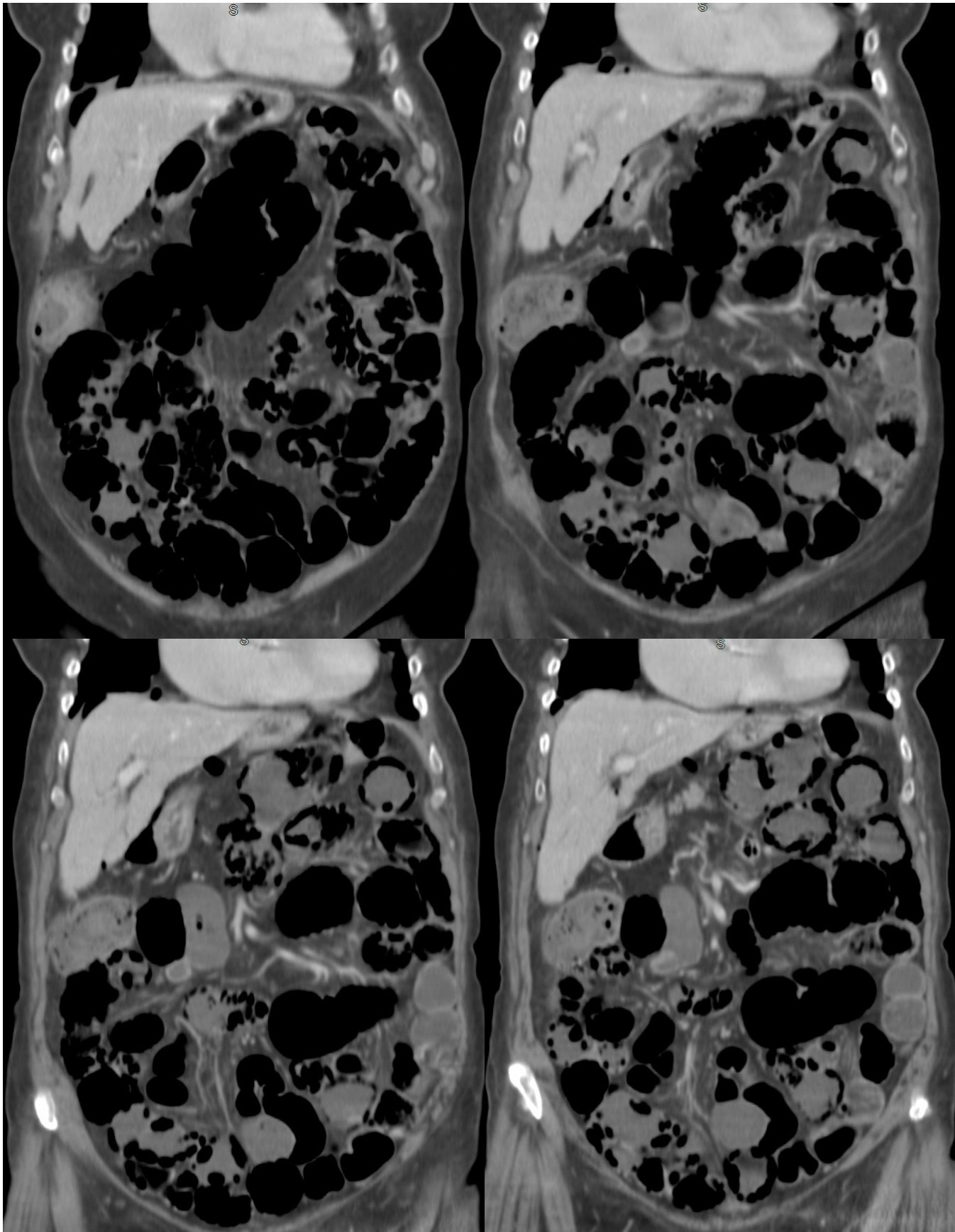Back


Poster Session B - Monday Morning
Category: Small Intestine
B0657 - Chronic Mesenteric Ischemia Causing Chronic Pneumatosis Intestinalis With Pneumoperitoneum
Monday, October 24, 2022
10:00 AM – 12:00 PM ET
Location: Crown Ballroom

Has Audio

Michael Meyers, MD
Mercy Health Grand Rapids/Michigan State University Internal Medicine Residency Program
Grand Rapids, MI
Presenting Author(s)
Michael Meyers, MD, Alicia Boone, DO
Mercy Health Grand Rapids/Michigan State University Internal Medicine Residency Program, Grand Rapids, MI
Introduction: Pneumatosis intestinalis (PI) is a condition in which gas is entrapped in the intestinal wall. In the context of abdominal pain and pneumoperitoneum, PI may reflect an intrabdominal catastrophe; however, there are other, more benign causes. We present a rare case of persistent PI with pneumoperitoneum secondary to chronic mesenteric ischemia.
Case Description/Methods: An 86-year-old female with past medical history of hyperlipidemia and coronary artery disease presented with an acute exacerbation of chronic abdominal pain. Pain was worsened by eating and physical exertion. On physical exam she was nontoxic appearing with abdominal distention and generalized tenderness without peritoneal signs. Abdominal x-ray was concerning for intraperitoneal free air. CT abdomen and pelvis with contrast revealed extensive PI throughout multiple loops of dilated small bowel with pneumoperitoneum. Additionally, atherosclerotic calcifications were seen throughout the abdominal vasculature, including at the origin of the celiac and superior mesenteric arteries. After a discussion with general surgery, the patient elected conservative management and was discharged with hospice care.
Unexpectedly, her condition remained stable; she graduated from hospice and followed with her primary care provider for the next seven years. She was placed on cilostazol for chronic mesenteric ischemia. Interventional radiology determined endovascular revascularization would not be feasible given the extent of disease. Her abdominal pain was improved with the aversion of fibrous foods, fatty foods, and meats; when pain and bloating persisted, she would make herself nil per os until symptoms resolved. She underwent CT scans at three years and six years after her initial presentation that showed persistent dilated small bowel with PI and pneumoperitoneum. She continued to do well with conservative management.
Discussion: PI with pneumoperitoneum is associated with gastrointestinal disease requiring emergent surgery. Initially, these alarming findings were concerning for acute mesenteric ischemia with bowel necrosis and perforation. However, the stability of her symptoms and radiographic findings indicated a severe case of chronic mesenteric ischemia. This case was unique given the profundity of these findings. This is an important reminder that PI with pneumoperitoneum is a nonspecific radiographic sign requiring careful clinical interpretation.

Disclosures:
Michael Meyers, MD, Alicia Boone, DO. B0657 - Chronic Mesenteric Ischemia Causing Chronic Pneumatosis Intestinalis With Pneumoperitoneum, ACG 2022 Annual Scientific Meeting Abstracts. Charlotte, NC: American College of Gastroenterology.
Mercy Health Grand Rapids/Michigan State University Internal Medicine Residency Program, Grand Rapids, MI
Introduction: Pneumatosis intestinalis (PI) is a condition in which gas is entrapped in the intestinal wall. In the context of abdominal pain and pneumoperitoneum, PI may reflect an intrabdominal catastrophe; however, there are other, more benign causes. We present a rare case of persistent PI with pneumoperitoneum secondary to chronic mesenteric ischemia.
Case Description/Methods: An 86-year-old female with past medical history of hyperlipidemia and coronary artery disease presented with an acute exacerbation of chronic abdominal pain. Pain was worsened by eating and physical exertion. On physical exam she was nontoxic appearing with abdominal distention and generalized tenderness without peritoneal signs. Abdominal x-ray was concerning for intraperitoneal free air. CT abdomen and pelvis with contrast revealed extensive PI throughout multiple loops of dilated small bowel with pneumoperitoneum. Additionally, atherosclerotic calcifications were seen throughout the abdominal vasculature, including at the origin of the celiac and superior mesenteric arteries. After a discussion with general surgery, the patient elected conservative management and was discharged with hospice care.
Unexpectedly, her condition remained stable; she graduated from hospice and followed with her primary care provider for the next seven years. She was placed on cilostazol for chronic mesenteric ischemia. Interventional radiology determined endovascular revascularization would not be feasible given the extent of disease. Her abdominal pain was improved with the aversion of fibrous foods, fatty foods, and meats; when pain and bloating persisted, she would make herself nil per os until symptoms resolved. She underwent CT scans at three years and six years after her initial presentation that showed persistent dilated small bowel with PI and pneumoperitoneum. She continued to do well with conservative management.
Discussion: PI with pneumoperitoneum is associated with gastrointestinal disease requiring emergent surgery. Initially, these alarming findings were concerning for acute mesenteric ischemia with bowel necrosis and perforation. However, the stability of her symptoms and radiographic findings indicated a severe case of chronic mesenteric ischemia. This case was unique given the profundity of these findings. This is an important reminder that PI with pneumoperitoneum is a nonspecific radiographic sign requiring careful clinical interpretation.

Figure: Initial CT showing extensive pneumatosis intestinalis with pneumoperitoneum.
Disclosures:
Michael Meyers indicated no relevant financial relationships.
Alicia Boone indicated no relevant financial relationships.
Michael Meyers, MD, Alicia Boone, DO. B0657 - Chronic Mesenteric Ischemia Causing Chronic Pneumatosis Intestinalis With Pneumoperitoneum, ACG 2022 Annual Scientific Meeting Abstracts. Charlotte, NC: American College of Gastroenterology.
